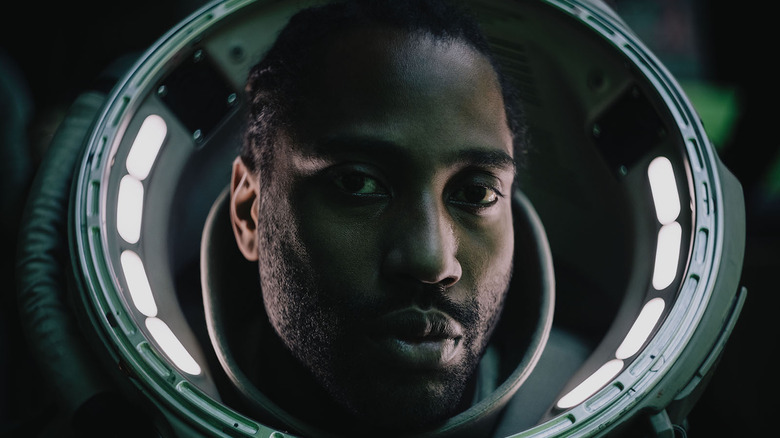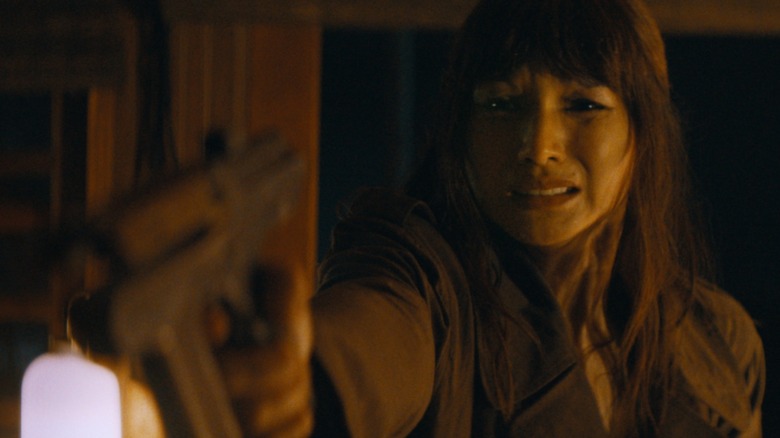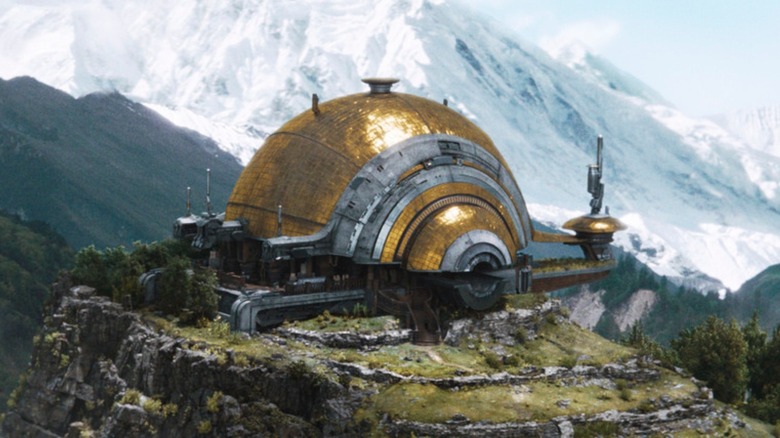Let's Break Down The Most Heartbreaking Death In The Creator
This post contains massive spoilers for the film "The Creator"
Gareth Edward's "The Creator" is set largely in 2070 when intelligent machines have come to populate most of the Earth. The United States is recovering from a nuclear attack, as a bomb was dropped on Los Angeles by some rogue AI that never revealed its motivation. The U.S. has since waged war on all AI, regularly invading other nations to hunt down and kill robots and their creators. America's key weapon is a massive suborbital airship called the NOMAD that can scan the countryside for enemies and bomb them the instant they are found. The NOMAD, it is said in dialogue, will easily wipe out all robot life on Earth.
One of the U.S. soldiers/agents is Joshua Taylor (John David Washington) who has located a counter-weapon that the androids intend to launch against the NOMAD. As it so happens, the weapon looks like a young girl whom Taylor nicknamed Alphie (Madeleine Yuna Voyles). Alphie may know the location of Taylor's presumed-dead wife Maya (Gemma Chan), so he goes rogue with Alphie to track her down. Many well-armed friends and foes, each with their own allegiances and motivations, are on his tail.
It will be revealed before the end of "The Creator" that Maya was deeply involved in the android resistance, and that her father — a semi-deity to androids — was one of AI's chief architects. As such, Maya was held in high esteem by the resistance and by spiritual robots everywhere. And, yes, androids to worship in the future. When Taylor finally finds her at the end of the film, he discovers that she's been in a coma for five years, kept alive by elaborate life-support machines.
Saddened, Taylor considers pulling the plug.
Buddhist views of euthanasia
Which, it turns out, Taylor does.
It's worth noting that Maya was being kept alive on a hospital gurney that had been placed on a stone altar in a Buddhist temple. She was being protected in a distant monastery by android monks who swore to protect her and keep her alive. The symbols of sanctity are myriad, as Maya is clearly worshiped.
Why were the Buddhist androids keeping Maya alive? According to the tenets of Buddhism, all life is sacred. All human life, all animal life, all plant life. A large part of Buddhism focuses on the transmigration of the soul, as living beings are reborn into new bodies multiple times throughout their lengthy existence. Death and rebirth are the fulcra of the Buddhist belief system. People can be born into higher and higher life forms until they reach a human form. Once a soul has achieved enlightenment, it has earned the honor of no longer reincarnating. As such, anything that has life is on a lengthy journey toward enlightenment, and we, as fellow living beings, should respect where they are on their path.
The Buddhist viewpoint generally opposes euthanasia on a moral level. Life is temporary, suffering is temporary, and protecting a living thing is ethical in all cases. As such, the Buddhist androids in "The Creator" were unable to end Maya's life, even though there was no hope of reviving her. Taylor, meanwhile, longed to see his beloved wife again and beg for forgiveness; she learned right before falling into a coma that he was a secret agent assigned to wed her to get information. Naturally, he fell in love and needed to make amends.
He will receive no absolution, though. Maya cannot forgive him. His only mercy is to switch her off.
It's all Maya
Later in the film, however, Maya and Taylor will have a brief moment of reconnection. Advanced technology allows for the shunting of a human consciousness into an android shell, which Maya will experience. Her comatose brain is scanned and put into a robot clone. In the high-tech world of "The Creator," this could be seen as the android version of transmigration. Having been reborn, she and Taylor have a moment where he can express contrition and be purified (which is more of a Christian conceit than a Buddhist one). This, however, happens during a violent climax, and the absolution comes at a moment when it looks like neither will survive for too much longer.
The name "Maya" was likely not chosen by accident. "Maya" is the Sanskrit word for "illusion," and also an alternate name for the Hindu deity Lakshmi. She is worshiped as a supreme protective goddess in the Vaishnavism sect of Hinduism, a personification of the Absolute. The titular "Creator" is referred to multiple times as "Nirmata," also a Sanskrit word, meaning "creator." Maya is a creator and a protector, her status as a semi-deity embedded in her name.
In Buddhism, "maya" — under the illusion definition — is one of 20 unwholesome mental factors (or upakleśa) that keep an enlightenment-seeking soul from seeing the truth and ascending. The whole world is maya, the wisdom goes, and the physical realm is a deception full of untrustworthy temptations. When Maya (the character) is reborn, the maya (the illusions) are shed. It's a sad ending for Taylor and Maya, but perhaps a spiritually cathartic one for the audience.
Multiple widespread faiths and belief systems are being hastily incorporated into Gemma Chan's character. The religious iconography is plentiful.
"The Creator" is now playing in theaters everywhere.


